Related Research Articles
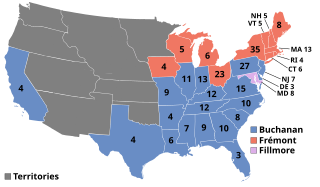
The 1856 United States presidential election was the 18th quadrennial presidential election, held on Tuesday, November 4, 1856. In a three-way election, Democrat James Buchanan defeated Republican nominee John C. Frémont and Know Nothing nominee Millard Fillmore. The main issue was the expansion of slavery as facilitated by the Kansas–Nebraska Act of 1854. Buchanan defeated President Franklin Pierce at the 1856 Democratic National Convention for the nomination. Pierce had become widely unpopular in the North because of his support for the pro-slavery faction in the ongoing civil war in territorial Kansas, and Buchanan, a former Secretary of State, had avoided the divisive debates over the Kansas–Nebraska Act by being in Europe as the Ambassador to the United Kingdom.

Henry Wilson was an American politician who was the 18th vice president of the United States from 1873 until his death in 1875 and a senator from Massachusetts from 1855 to 1873. Before and during the American Civil War, he was a leading Republican, and a strong opponent of slavery. Wilson devoted his energies to the destruction of "Slave Power", the faction of slave owners and their political allies which anti-slavery Americans saw as dominating the country.
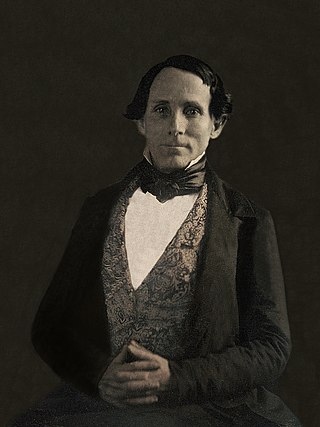
Henry Stuart Foote was a United States Senator from Mississippi and the chairman of the United States Senate Committee on Foreign Relations from 1847 to 1852. He was a Unionist Governor of Mississippi from 1852 to 1854 and an American Party supporter in California. During the American Civil War, he served in the First and Second Confederate Congresses. A practicing attorney, he published two memoirs related to the Civil War years, a book on Texas before its annexation and a postwar book on the legal profession and courts in the Southern United States.

Henry Bowen Anthony was a United States newspaperman and political figure. He served as editor and was later part owner of the Providence Journal. He was the 21st Governor of Rhode Island, serving between 1849 and 1851 as a member of the Whig Party. Near the end of the 1850s, he was elected to the Senate by the Rhode Island Legislature and was re-elected 4 times. He would be twice elected to the Senate's highest post as President pro tempore during the Grant administration, and served until his death in 1884.
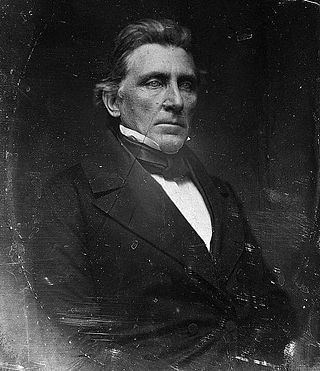
William McKendree Gwin was an American medical doctor and politician who served in elected office in Mississippi and California. In California he shared the distinction, along with John C. Frémont, of being the state's first U.S. senators. Before, during, and after the Civil War, Gwin was well known in California, Washington, D.C., and the Southern United States as a determined Confederate sympathizer.

James Thompson Farley was a United States Senator from California.

Henry Winter Davis was a United States Representative from the 4th and 3rd congressional districts of Maryland, well known as one of the Radical Republicans during the Civil War. He was the driving force behind the abolition of slavery in Maryland in 1864, and it was largely because of him that Maryland did not secede.

The 34th United States Congress was a meeting of the legislative branch of the United States federal government, consisting of the United States Senate and the United States House of Representatives. It met in Washington, D.C., from March 4, 1855, to March 4, 1857, during the last two years of Franklin Pierce's presidency. The apportionment of seats in the House of Representatives was based on the 1850 United States census. The Whig Party, one of the two major parties of the era, had largely collapsed, although many former Whigs ran as Republicans or as members of the "Opposition Party." The Senate had a Democratic majority, and the House was controlled by a coalition of Representatives led by Nathaniel P. Banks, a member of the American Party.
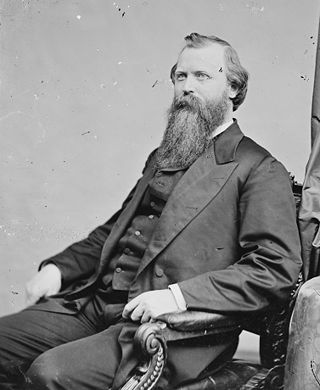
William Morris Stewart was an American lawyer and politician. In 1964, he was inducted into the Hall of Great Westerners of the National Cowboy & Western Heritage Museum.
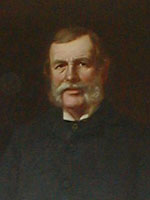
Henry Joseph Gardner was the 23rd Governor of Massachusetts, serving from 1855 to 1858. Gardner, a Know Nothing, was elected governor as part of the sweeping victory of Know Nothing candidates in the Massachusetts elections of 1854.
Thomas Richard Whitney was a nineteenth-century politician and writer from New York.

The Know Nothings were a nativist political movement in the United States in the 1850s, officially known as the Native American Party before 1855, and afterwards simply the American Party. Members of the movement were required to say "I know nothing" whenever they were asked about its specifics by outsiders, providing the group with its colloquial name.

The 1855 United States Senate election in New York was held on February 6, 1855, by the New York State Legislature to elect a U.S. Senator to represent the State of New York in the United States Senate.

The 1852–53 United States Senate elections were held on various dates in various states, coinciding with the 1852 presidential election. As these U.S. Senate elections were prior to the ratification of the Seventeenth Amendment in 1913, senators were chosen by state legislatures. Senators were elected over a wide range of time throughout 1852 and 1853, and a seat may have been filled months late or remained vacant due to legislative deadlock. In these elections, terms were up for the senators in Class 2.

The 1850–51 United States Senate elections were held on various dates in various states. As these U.S. Senate elections were prior to the ratification of the Seventeenth Amendment in 1913, senators were chosen by state legislatures. Senators were elected over a wide range of time throughout 1850 and 1851, and a seat may have been filled months late or remained vacant due to legislative deadlock. In these elections, terms were up for the senators in Class 1.
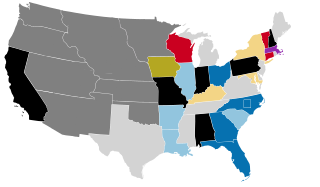
The 1854–55 United States Senate elections were held on various dates in various states. As these U.S. Senate elections were prior to the ratification of the Seventeenth Amendment in 1913, senators were chosen by state legislatures. Senators were elected over a wide range of time throughout 1854 and 1855, and a seat may have been filled months late or remained vacant due to legislative deadlock. In these elections, terms were up for the senators in Class 3.
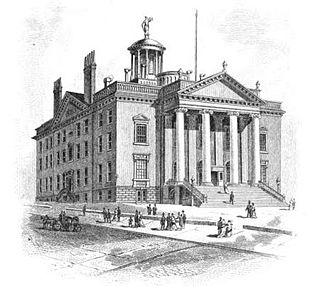
The 78th New York State Legislature, consisting of the New York State Senate and the New York State Assembly, met from January 2 to April 14, 1855, during the first year of Myron H. Clark's governorship, in Albany.
The 1855 United States Senate special election in Massachusetts was held during January 1855. Henry Wilson was elected to fill the remainder of the term left vacant by the resignation of Edward Everett.
The 1854 Massachusetts gubernatorial election was held on November 15. American Party candidate Henry J. Gardner was elected to his first term as governor, defeating incumbent Whig Governor Emory Washburn.

In the 1856 Iowa State Senate elections, Iowa voters elected state senators to serve in the sixth Iowa General Assembly. Following the expansion of the Iowa Senate from 31 to 36 seats in 1856, elections were held for 21 of the state senate's 36 seats. State senators serve four-year terms in the Iowa State Senate.
References
- ↑ Carter, John D. (May 1943). "Henry Stuart Foote in California Politics, 1854-1857". The Journal of Southern History. 9 (2): 224–237. doi:10.2307/2191800. JSTOR 2191800.
- ↑ "Record of State Senators 1849–2020" (PDF). Office of the Secretary of the Senate. Retrieved 16 March 2024.
- ↑ Richards, Leonard L. (2007). The California Gold Rush and the Coming of the Civil War. Knopf Doubleday Publishing Group. ISBN 9780307267375 . Retrieved 16 March 2024.